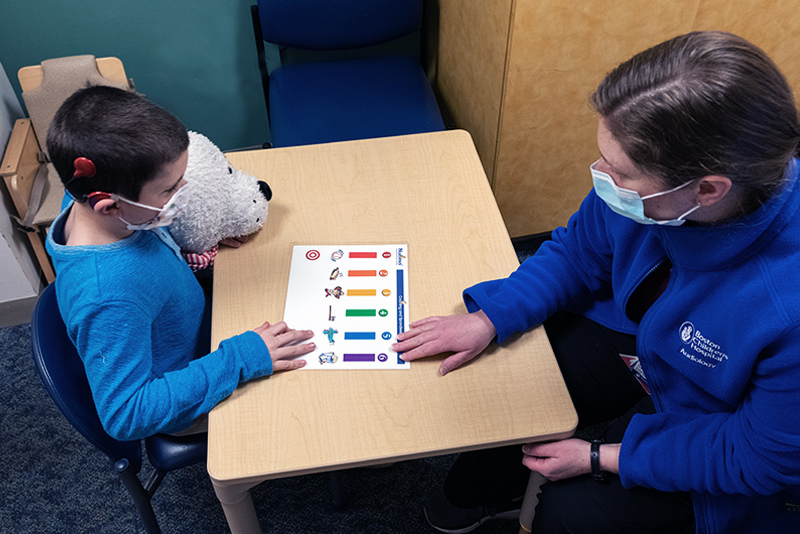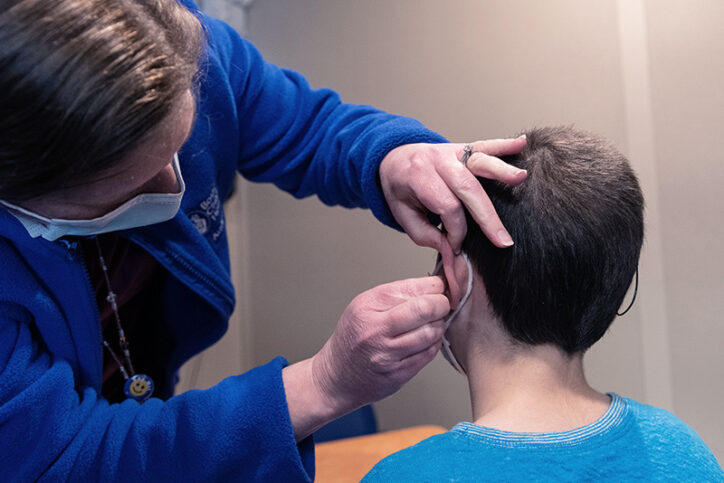Are cochlear implants an option for my child?

By providing access to sound, cochlear implants have made it possible for children with severe to profound hearing loss to communicate through speech. The devices transmit signals from external processors to the brain via units implanted underneath the skin and small wires connected to the inner ear.
“Cochlear implants can be life changing for a child,” says Dr. Aaron Remenschneider of the Cochlear Implant Program at Boston Children’s Hospital. “They provide access to sound and open the door for speech and language development.”
Questions surround the devices, however: How well do cochlear implants help children hear? Do the devices affect a child’s language skills? Are cochlear implants an option for acquired hearing loss? Here, Dr. Remenschneider answers some of the most common questions about cochlear implants.
How do cochlear implants affect speech development?
To explain the relationship between cochlear implants and speech, Dr. Remenschneider often starts with a description of how language skills develop. Long before a baby utters their first words, sound traveling from their ears to the brain create “auditory pathways.” These pathways — made up of nerve connections — form the foundation on which children learn to recognize speech and develop spoken language.
“Cochlear implants permit stimulation of the hearing nerve and development of the auditory pathways,” says Dr. Remenschneider. “This enables children born without hearing to understand and develop speech — a process that happens early in life.”
Is it fair for me to choose cochlear implants for my child?
Because speech development happens early, the best time for cochlear implant surgery often comes well before a child is old enough to have a say in the decision.
“If a child is born with no hearing at all, we have a window of time in which a cochlear implant will work most successfully,” says Dr. Remenschneider. The devices can be implanted in children as young 9 months old. If implanted after a child is 6 or 7, the devices can enable them to hear sound, but the child probably will never recognize speech.
Having cochlear implants does not rule out other ways of communicating. Boston Children’s Deaf and Hard of Hearing Program, for instance, helps patients learn other forms of communication such as American Sign Language.
A child with cochlear implants can always decide not to use their devices. But if they don’t develop language skills early, they won’t have that option when they get older. “There is considerable data to support early implantation for children born with severe to profound hearing loss to maximize speech and language development,” says Dr. Remenschneider.
My child lost their hearing after they were born. Are cochlear implants an option?
Yes. In fact, most cochlear implants placed are for patients who lose their hearing over time or as the result of head injury or illness.
“The use of cochlear implants has changed quite a bit over the last 30 years,” says Dr. Remenschneider. “They are now an option for patients with progressive hearing loss or hearing in only one ear who cannot benefit from a hearing aid.” The Audiology Program at Boston Children’s, which fits hearing aids and assistive devices, helps determine when cochlear implants would better serve a child’s needs.

Who should be involved in my child’s care?
Boston Children’s cochlear implant team includes doctors, audiologists, speech-language pathologists, and psychologists. “Before undertaking a surgery that’s going to have a big impact on the child’s life, we work together to fully understand and address all of their unique needs,” says Dr. Remenschneider.
Psychologists on the team, for instance, help determine if a patient has a secondary condition that can affect communication like autism spectrum disorder or attention deficit hyperactivity disorder (ADHD). “The psychologists on our team can diagnose and differentiate such contributing factors so we can focus on the health of the whole child.”
Once the devices are implanted, audiologists and other members of the team help children adapt to them, which can take several months or up to a year. Children who are developing speech and language for the first time typically continue to work with speech pathologists for several years.
How is the sound quality through cochlear implants?
Patients have different assessments of cochlear implant sound quality, particularly those who were born with hearing loss. Many patients say the sound is natural and allows them to appreciate both speech and music. Others talk about some of its limitations.
“It’s important that families know that the sound provided by a cochlear implant is not exactly the same as typical hearing,” says Dr. Remenschneider. Nonetheless, having access to sound provides significant benefits. “It completely changes someone’s life to go from being unable to hear to understanding speech.”
Will my child need new implants if cochlear implant technology changes?
Technology improvements have already led to better cochlear implant sound quality, and the work continues. Most of the advances, however, center on the external processors and how they’re electronically programmed. In short, patients won’t need to have the implanted portion of their devices replaced.
People may have different opinions about cochlear implants, but as a specialist in the field of hearing and language development, Dr. Remenschneider sees a world of positives.
“This is a wonderfully successful device that really does transform life for a child who was born without hearing,” he says. “I think that’s something truly magical that we’re able to offer families.”
Learn more about the Cochlear Implant Program.
Related Posts :
-

How I hear you: Isabelle’s cochlear implant story
Isabelle is a thriving AP student, hockey player, and online gamer who listens to music and communicates with the help ...
-

A different kind of hearing: Caleb’s cochlear implant
Caleb recently told his mother, “I think I’m going to write my own stories.” This news didn’t surprise ...
-

‘Empowered to be there for Teagan’: New parents learn about hearing loss
Teagan O’Brien is a bright, spunky 4-year-old who loves reading, dancing, and playing outdoors. Her parents, Kim and Donnie, ...
-

Learning to speak with the help of a bone-anchored hearing system: Owen’s story
Why does 4-year-old Owen love Ghost Spider? For one thing, her suit has purple highlights. For another, her hand forms ...





